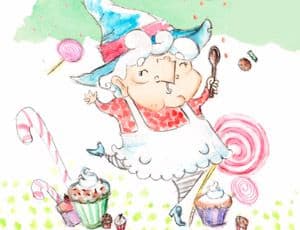Teacher's support sheet

Anastacia, the candymaker
Contrary to what everyone thinks, the kids were not abandoned in the forest by their parents. They were naughty and liked to venture into the woods. On one of these adventures, they found a house made of sweets! It was Anastácia's house, a friendly candymaker.

Teacher’s tips
Level of education: Elementary School - Early Childhood Education
Age: 04 to 08 years old
Most young children live in a very limited environment. Reading stories to children can show them faraway places, extraordinary people, and eye-opening situations to expand and enrich their world.
It can also be a great way to help them deal with real-life situations they need help with. Researchers have found that the brain activity that occurs when we read fiction is very similar to experiencing that situation in real life, so reading about a situation helps children figure out how to resolve it in reality.
Learner outcomes
Develop text reading and interpretation; Understand the use of the alphabet in the construction of words; Expand vocabulary; Stimulate the imagination; Stimulate creativity; Participate in different moments of reading; Develop attentive listening to understand texts; Develop and improve oral and written language; Read different types of short stories;
Teachers’ goals
Work on reading and text interpretation skills; Provide, in a playful and creative way, the progress in the reading and writing process of children; Expand the class's repertoire of letters and words; Work principles; Offer the game as a didactic resource to fix the content worked in the classroom; Awaken the habit of listening and feeling pleasure in situations involving reading; Provide contact with texts of literary quality;
Suggestions of approaches for the teacher
(Suggestion 1) Develop word search activities
(Suggestion 2) Use hangman.
(Suggestion 3) Propose word dictation
(Suggestion 4) Promote the reading of poems and rhymes.
(Suggestion 5) Work with cordel literature.
(Suggestion 6) Run delicious recipes with students to develop reading, writing, and math skills.
(Suggestion 7) Promoting the activities of assembling and disassembling words with the movable alphabet, with letters made of paper, plastic or wood, allow the learner to experience, in a very rich way, a series of decisions about how to write.
(Suggestion 8) Complete the word. Write words with missing syllables on the board. Ask students to complete them and then make an illustration.
(Suggestion 9) Ask students to create an authored version of a favorite children's story.
More about it
Benefits of reading for children
Stories help children to develop imagination and creativity.
Stories help your children to develop language and thinking, especially when they hear or read them in their mother tongue.
The stories provide children with examples of how people deal with the challenges they face.
Even 15 minutes of reading with children a day can expose them to 1 million written words a year.
Listening to stories and reading at home are most likely to help make children successful in school.
Children who have enjoyable experiences of storytelling and reading at home are more likely to be motivated to read.
Reading aloud with children is known to be the single most important activity for building the knowledge and skills they will eventually need to learn to read.
Books contain many words that children are unlikely to often encounter in spoken language.
The most significant factor influencing a child's early educational success is the introduction to books and reading at home before starting school.
Students who hear stories are the first to form abstract concepts in the curriculum. Storytelling stimulates language and, by fueling the child's imagination, develops abstract thinking.
Children who read a lot rather than watch television develop longer attention spans.
When reading is good for children, they become readers. We all repeat things that are pleasurable.
